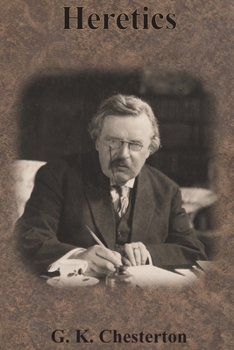Heretics
Select Format
Select Condition 
Book Overview
Complete edition of Heretics by G. K. Chesterton. Chesterton discusses ideas by H. G. Wells, George Bernard Shaw, Kipling and others of his day in his argument for God. Still thought provoking after 100 years, find out why in this complete reproduction of the 1905 British Edition. Deep common sense on every page, it includes great thoughts such as these: "The modern world is filled with men who hold...
Format:Paperback
Language:English
ISBN:1640322582
ISBN13:9781640322585
Release Date:April 1905
Publisher:Chump Change
Length:86 Pages
Weight:0.29 lbs.
Dimensions:0.2" x 6.1" x 9.2"
Related Subjects
Apologetics Fiction Literature & Fiction Philosophy Religion Religion & SpiritualityCustomer Reviews
4 ratings
Early Review
Published by Thriftbooks.com User , 17 years ago
Just begain reading "Heretics." I wish I had found this book, and Chesterton, 30 years ago when I was 20 instead of now when I am 50. Ideas and actions can take decades sometimes a century or more to "bloom." During 1905, Chesterton identifies errors that have bloomed and guide/justify our day's thinking & action -- runious errors. Can't wait to finish. Should be required reading.
Heretics
Published by Thriftbooks.com User , 17 years ago
A fantastic book by a great writer, highly recommend it for anyone interested in Apologetics, or just fun argument should definitely read it. While this review will hardly do justice to him, Chesterton is amazingly complex, and while sometimes incorrect, offensive, or fallacious, he is always intelligent, witty, and generally has an opinion very much worth listening to. Highly recommended.
An Unorthodox Defense of Orthodoxy
Published by Thriftbooks.com User , 20 years ago
George Bernard Shaw, the subject of one of the essays in this book, once wrote that morals were for the middle class. The lower class couldn't afford them and the upper class could afford to do without them. Modern day "thinkers" assail the Judeo-Christian ethic as irrelevant to any class and pride themselves on their thoroughly contemporary avant-garde world view. How ironic it is that this thoroughly modern iconoclasm has been around for at least 100 years. Chesterton weighs in on the "heretics" of his day who prided themselves in their heretical superiority to conservative orthodoxy. These heretics seem to have had a worldview not much out of step with modern avant-garde thought. Chesterton's critique of these ideas is lucid, lyrical, and logical. The passage of 100 years has obscured the context of much of what he says, but his conclusions are as timely today as they were yesterday.
SPARKLING CHESTERTON
Published by Thriftbooks.com User , 20 years ago
A 1905 collection of twenty Victorian journalistic essays and articles still worth reading, and not merely on historical or nostalgic grounds? Some pieces are of mainly historical interest, but not most. Neither is it a 'religious title', in fact it is nearly irreligious in places. It merely takes issue with arty types like Mr. Kipling, G.B. Shaw, H.G. Wells, and Whistler. It is also vintage Chesterton, at his usual paradoxical, oblique, witty, funny, slapstick, sardonic, jolly, and generous best.It is a positive and happy book, but it was accused of Negativism in its day (Kafka said Chesterton was so full of joy that you might almost suppose 'he had found God'--perverse but honest.) Another exasperated opponent, said that if he was so clever and all-knowing he should write down his own personal positive beliefs. So he did. They are still read today, and many who enjoy 'Orthodoxy' (1908) will enjoy this, its progenitor too, which is impossible to summarize, so I have given a thumbnail of each chapter.CONTENTSChapter 1. Introductory remarks on the importance of orthodoxyThe examined life - meaninglessness of modern subjective attitudes of not owning your own point of view. Decline of respect for reason and rational argument - political correctness, or 'Good taste, the last and vilest of human superstitions'. To know a man's worldview is to know him. Pernicious effects of subjectivism in literature and the arts.2. On the negative spiritEssential need for positive belief - no society can prosper on negative laws alone. Progress in human rights of liberty, education, free speech, and tolerance are only guaranteed with 'a definite creed and a cast-iron code of morals'.3. On Mr. Rudyard Kipling and making the world smallKipling considerable poet but no true patriot, but proto-fascist. [GKC probably first to spot this.] Worships strength and discipline, empire-building, for their own sake. 'He admires England, but he does not love her'.4. Mr. Bernard Shaw***GOOD***[GKC being good friend of GBS.] GBS brilliant and witty, but hopeless subjectivist. GBS attacks all pretensions as 'every moral generalization oppressed the individual; the golden rule was there is no golden rule'. But then why should we allow Him to make the One Rule that rules them all? Perpetrates errors of sociologist/anthropologist, still with us today.5. Mr. H.G. Wells and the giants***GOOD***Wells' faith in Evolutionism (as opposed to evolution) shown to be false - 'the scientific fallacy...of not beginning with the human soul...but with some such thing as protoplasm'. The demonstrable fact of original sin in the universal existence of selfishness. Wells' Utopia assumes selfishness can be cured by ignoring it, not curing it. 'Heresy of immoral hero-worship' (ie, celebrity).6. Christmas and the aesthetesEssential nature of ritual. Attacks 'The religion of Comte, generally known as Positivism, or the worship of humanity'. Comte's attempt to institute a secular religion - ritual the only






